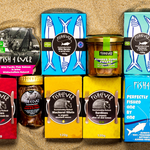You have no items in your shopping cart.
Fish4Ever are proud to launch Yellowfin Tuna certified Fair Trade by Fair Trade USA.
The United Nations Sustainable Development Goals emphasize that eradicating poverty must go hand in hand with strategies to improve health and education, reduce inequality and boost economic growth, while tackling climate change.
According to the Food and Agriculture Organization of the United Nations (FAO), fish is the most exported commodity by developing countries. We all buy fair trade chocolate, coffee, bananas and tea – now you can finally find fair trade tuna!

What is Fair Trade?
Fair trade aims to reduce the social and environmental inequalities of disadvantaged producers in order to guarantee them a stable and remunerative price and allow them to live with dignity from their work. A partnership is then established between a buyer (a company) and a producer organization (farmers, fishermen, etc.).
Once the fair trade sector has been set up, each party undertakes to respect a certain number of rules.

Who is Fair Trade USA (FTUSA)?
There are several fair trade certifications around the world and although the principles of fair trade are recognized internationally, they all have slightly different standards. FTUSA is the only organization to have developed fair and sustainable catch standards for wild fishing.
Pole and line fishing in the Maldives
Did you know that in the Maldives the consumption of fish reaches more than 140kg per year per inhabitant? The Maldives are made up of 26 atolls (1190 islands) located in the middle of the Indian Ocean and the inhabitants have always fished. Traditionally, the fish is caught one by one, synonymous with quality and sustainability. The pole-and-line fishery supports approximately 30,000 people and the main species fished is tuna (90% of catches). Fishing is the second most important activity after tourism, but it is much more democratic and participatory. The Maldives government sets a minimum price for fish that guarantees a fair return and ensures that fish is never sold below the cost of fishing.

The Fair Trade project goes further and directly involves the local community, local fishermen and the cannery located on Laamu Atoll.
The fair trade project in the Maldives in a few figures:
- 525 fishermen
- 33 boats
- 5 cooperatives
- 5800 members
- Additional bonus of $0.04/kg of fish – $200,000+ paid since 2017
At the production level, the fresh fish is landed directly at the cannery, which only receives tuna caught by pole and line by partner boats.
The production site complies with the strictest food safety and hygiene standards and is ISO, BRC, FSSC 22000, organic and fair trade certified. The independent agency SEDEX and the certifier FTUSA regularly visit the fishery and the cannery to ensure that labour rights, health, safety, the environment and business ethics are well respected.

What about the overfishing of yellowfin tuna in the Indian Ocean?
Yellowfin tuna is overfished. Foreign industrial vessels represent 1/3 of the catches and supply two canneries which belong to two of the largest tuna multinationals. According to the Indian Ocean Tuna Commission (IOTC), purse seine fishing accounts for 44% of total tropical tuna catches and 34% of fish are caught by foreign vessels (EU, Spain, Seychelles and France).
The state of the stocks has worsened due to false catch declarations discovered by the IOTC, the deactivation of monitoring systems but above all due to industrial boats which almost exclusively target juvenile yellowfin tuna by directly targeting spawning grounds.
The situation is complicated by the presence of a growing number of artisanal fisheries from coastal states – such as Iran, Pakistan and India – which take an increasingly large share of the catches while the total population of yellowfin is already in decline. They use gillnets and other methods and fish without IOTC approval.
At Fish4Ever we refuse to support a system that punishes those who have always fished well and collaborate with international experts and abandon good fishermen because of the mistakes of their neighbours.
What is the political situation in the Maldives?
The political situation in the Maldives needs improvement, but the EU lifted its sanctions following democratic elections in 2018. The situation is not perfect, the country is heavily dependent on tourism, a sector greatly affected by the health crisis, and unfortunately, the abuses of immigrant workers have not been completely eradicated.
However, the fishing industry in the Maldives has always been very transparent and well managed regardless of political issues in the country. The fair project is obviously an additional guarantee for the respect of the rights of local and foreign workers, of their working and living conditions and the controls are regular.
Refusing to work with an exemplary company on the pretext that the country in which it is located has committed abuses is counterproductive and will not change things. We therefore remain very vigilant and cooperation would only stop if one of our partners were directly involved in abuse.













